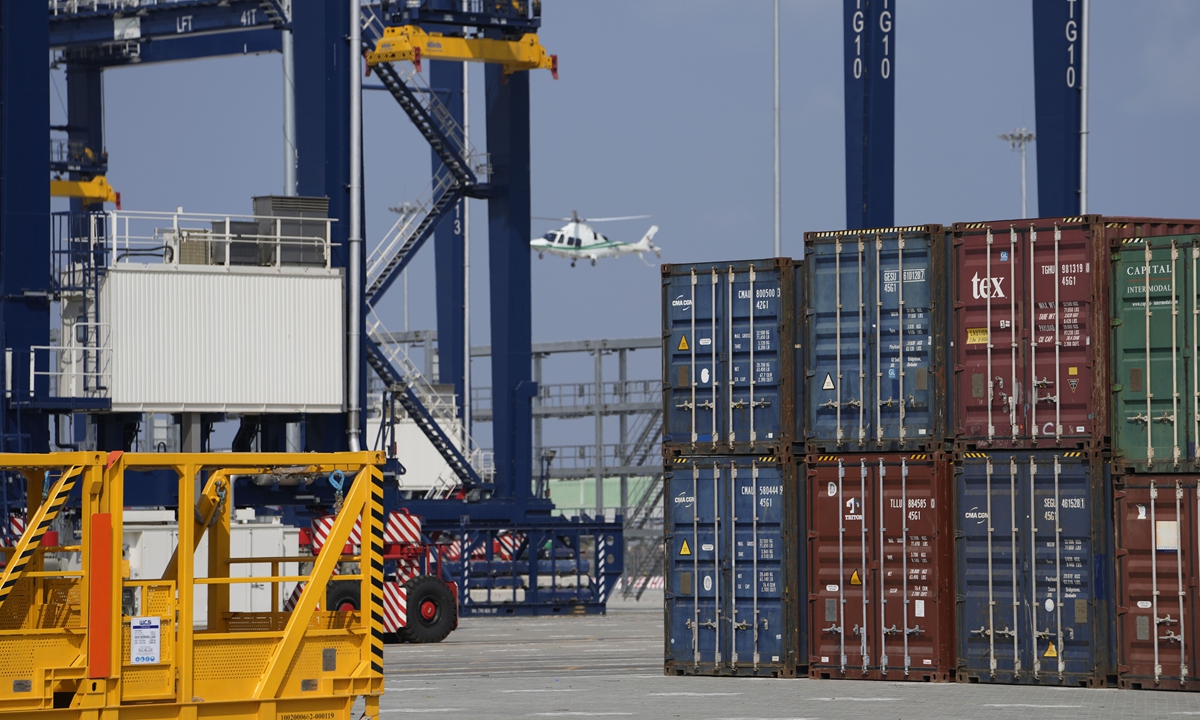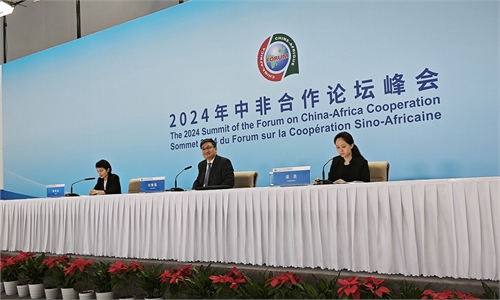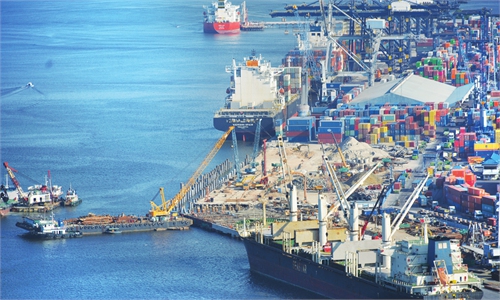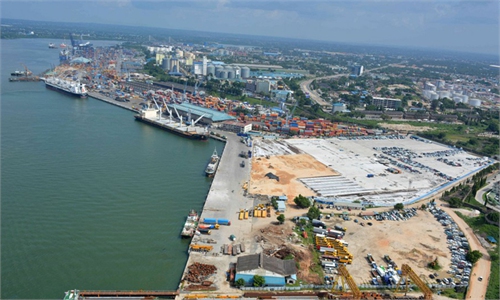China and Africa forge stronger bonds under BRI
Western ‘debt trap’ allegations a smear on bilateral cooperation

A view of the Lekki Deep Sea Port constructed by the China Harbor Engineering Company Ltd in Lagos, Nigeria, on January 23, 2023 Photo: VCG
With the 2024 Summit of the Forum on China-Africa Cooperation (FOCAC) being held in Beijing from Wednesday to Friday, unfounded "debt trap" allegations against China-Africa cooperation are circulating once again.
Having celebrated its 10th anniversary last year, the China-proposed Belt and Road Initiative (BRI) has been widely welcomed by global communities, including those in Africa. It has achieved significant milestones, particularly in improving infrastructure, investment, and trade across African countries.
A total of 52 African countries and the African Union have signed memorandums of understanding with China to jointly advance the BRI, according to media reports. Experts said this is a vivid example of how African countries are voting with their feet when it comes to the initiative.
On the occasion of the FOCAC summit, foreign envoys, reporters, and experts have collectively rejected the "debt trap" rhetoric being propagated by Western media targeting the BRI and China-Africa cooperation. They have also praised the notable achievements in social and economic development in African countries, where the BRI has played an important role.
False allegations
Western criticisms of China-Africa cooperation and the BRI have intensified ahead of the FOCAC summit. This ill-intentioned attempt to undermine China-Africa ties has met with strong opposition from Chinese experts, as well as African representatives participating in the forum.
In a recent interview with the Global Times, Tanzania Ambassador to China Khamis Mussa Omar said that Africa has been raising its voice on the need for broader reform when it comes to international development financing architecture. The BRI, which has injected new impetus in trade and investment cooperation, has extended a critical helping hand on this regard, he said.
These words reflect the stance of many Africans regarding the positive outcomes of the BRI.
Chinese experts said that allegations of the BRI causing a "debt trap" are groundless. They argued that the "debt trap" narrative is an attempt by some Western media outlets and politicians to undermine the positive outcomes of China's win-win cooperation with African countries.
"Some Western countries have frequently accused China-Africa cooperation of being a 'debt trap,' which reflects their doubts about the capabilities of African countries to manage their internal affairs independently. This, in turn, is an insult," Ma Hanzhi, assistant research fellow at Department for Developing Countries Studies, China Institute of International Studies, told the Global Times.
In recent years, African countries have faced difficulties in accessing financing, which has hindered efforts to develop the continent. With investment and support from Chinese companies, many roads and houses have been constructed, and power stations and electricity networks have been established to address key issues such as electricity shortages that impede social and economic development in these countries, experts noted.
Instead of attributing all these positive outcomes to cooperation, many Western media outlets and politicians have concocted the "debt trap" theory, which is unjustified and lacks a factual basis, Ma said.
In an official response to the "debt trap" narrative, Shen Xiang, an official from China's Ministry of Commerce, stated at a recent press conference on August 20 that China has never been the main creditor behind African debt.
Data from the International Monetary Fund indicates that among Africa's external debt, commercial bonds and multilateral debt account for 66 percent of the total, while China-Africa bilateral debt constitutes only 11 percent.
"Some people are making unfounded claims about Africa's debt issue, and these criticisms lack a factual basis," Shen said.
Experts noted that a significant portion of Africa's debt consists of private debt, for which the US bears much of the responsibility. In recent years, some Western countries relaxed borrowing conditions, leading to a surge of capital inflows into Africa. However, with the recent increase in US interest rates, capital outflows have intensified Africa's debt challenges, Ma said.
In a previous interview, Nigerian Foreign Minister Yusuf Maitama Tuggar praised the BRI for helping to build roads, provide electricity, and create much-needed jobs for his country. Tuggar refuted the Western media narrative that the BRI has led to a "debt trap" in developing countries, calling the notion of China's attempt to influence Africa through the BRI "an insult" to African nations.
Real benefits
In stark contrast to the false propaganda and conditional aid offered by some Western countries, China has brought real changes to many African countries without imposing any political or economic conditions, as highlighted by solid evidence.
The latest data shows that the bilateral trade volume between China and Africa reached a historic $282.1 billion last year, making China Africa's largest trading partner for 15 consecutive years.
Speaking at a press conference for FOCAC on Tuesday, Lin Honghong, director general of the Department of International Relations of the China Council for the Promotion of International Trade, said that by the end of 2023, China's direct investment in Africa had exceeded $40 billion, making it one of the largest sources of foreign investment on the African continent.
Moreover, in the past three years, Chinese companies have created over 1.1 million local jobs in Africa.
"These figures clearly demonstrate that China-Africa economic and trade cooperation continues to maintain a strong development momentum," Lin noted.
Commenting on the achievements, Samuel Ayammah, a reporter from the Ghana Broadcasting Corporation, told the Global Times at the forum on Wednesday that the BRI benefits many African countries, including his home country Ghana.
"When you look at the projects under the BRI and the kind of collaboration between China and Africa, I'm sure it's good," Ayammah said, noting that the cooperation is based on mutual respect.
Rugare Mukanganga, a data and economic analyst at Development Reimagined, highlighted another important aspect of China-Africa cooperation, stating that through principles such as non-interference in domestic affairs, it presents a non-coercive model that empowers African countries to chart their own course.
"African countries collaborate with China due to the significant benefits it has brought to the social and economic development of the continent." Ma said.
He emphasized that, more importantly, China-Africa cooperation is rooted in mutual respect and interests, without imposing any additional conditions as some Western countries do, reflecting the choices and decisions of the African people and their governments.
As the BRI has entered a new stage of high-quality development, China will further advance its reforms and opening-up, aiming to build a more open global economy. Experts said that in this context, China-Africa cooperation is facing new opportunities.



